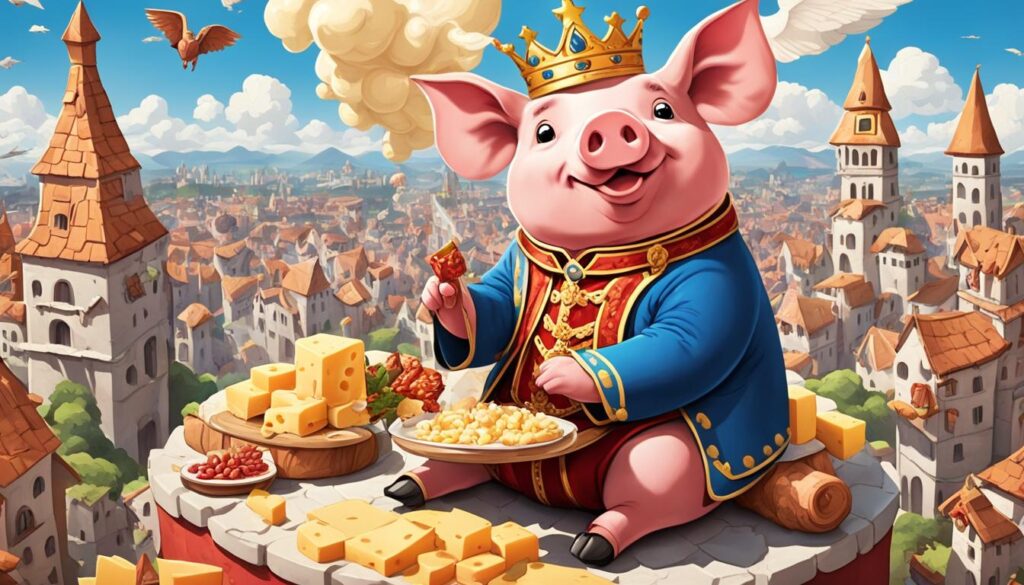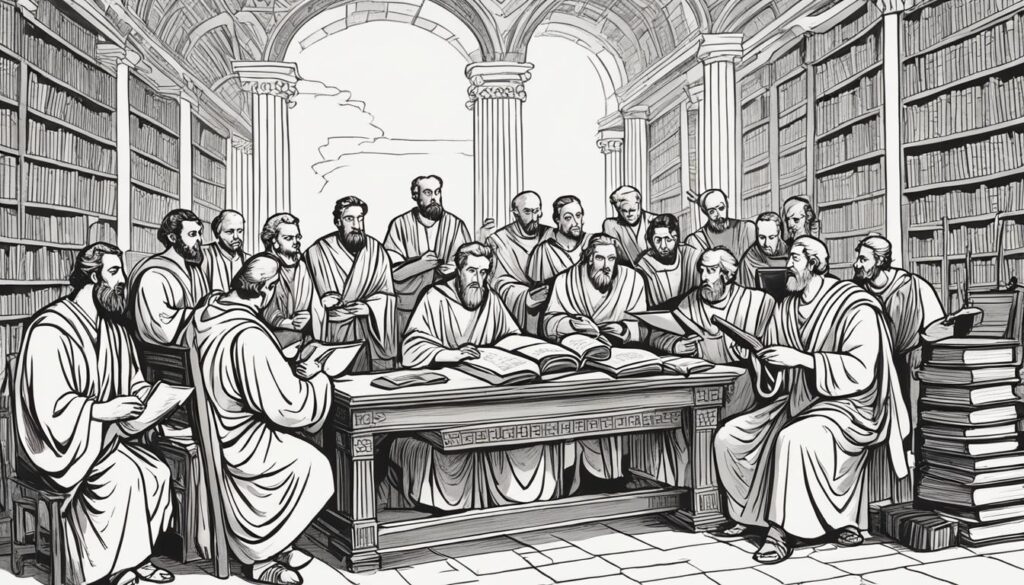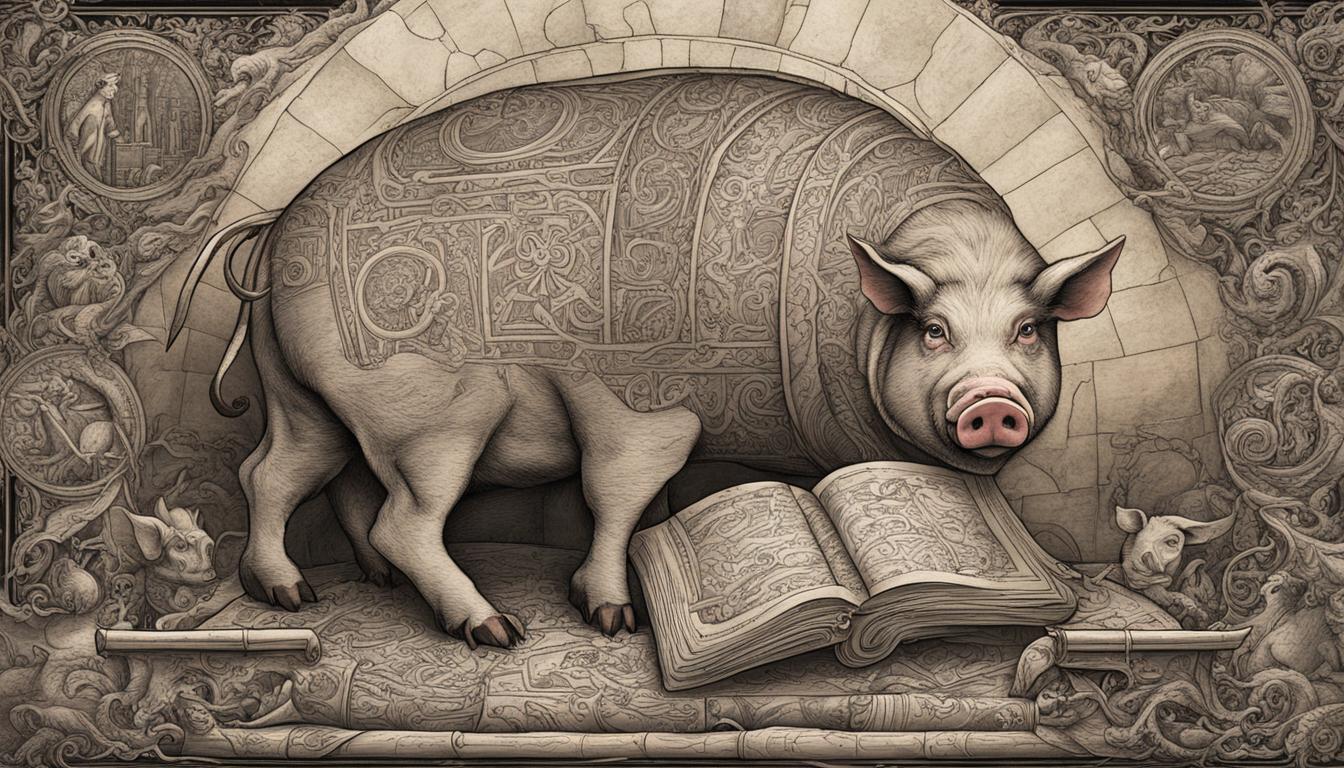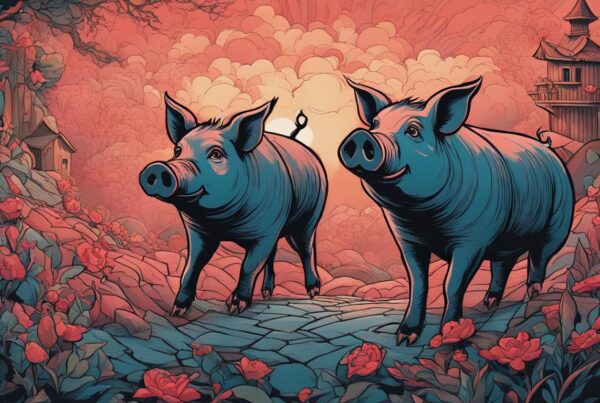“The Pig Scrolls” by Gryllus the Pig, written by Paul Shipton, is a satirical novel that has gained popularity for its humorous and adventurous story. The novel follows the protagonist, Gryllus, on a heroic journey through a whimsical world filled with humor and social commentary.
In this book summary, we will provide an overview of the key elements of the novel, including the characters, themes, and narrative techniques used by the author to create a unique and entertaining story.
Key Takeaways:
- The Pig Scrolls by Gryllus the Pig, written by Paul Shipton, is a satirical novel known for its humorous and adventurous story.
- The novel follows Gryllus, the protagonist, on a heroic journey through a world filled with humor and social commentary.
- In this book summary, we will explore the key elements of the novel, including its characters, themes, symbolism, and cultural and historical context.
- The book has garnered attention and praise since its publication, and its impact has been felt in the literary world.
- “The Pig Scrolls” offers a thought-provoking read that combines humor with social commentary, making it a unique and entertaining book for readers to enjoy.
Introduction to “The Pig Scrolls”
Set in a satirical world, “The Pig Scrolls” follows the adventures of an unlikely hero, Gryllus the Pig. Written by Paul Shipton, this novel takes readers on a humorous and whimsical journey through a mystical land filled with unique characters and unexpected situations.
Gryllus the Pig is a compelling protagonist with a relatable and amusing personality. As readers follow his journey, they are immersed in a world that blends satire, adventure, and humor to create a memorable reading experience.
With its unique blend of genres, “The Pig Scrolls” offers something for every reader. The novel’s satirical nature allows readers to reflect on real-world issues while enjoying an entertaining story. In this section of our article, we will delve into the main characters, themes, and tone of the book to provide an introduction to this satirical novel.
Gryllus’s Heroic Journey
In “The Pig Scrolls,” Gryllus the Pig embarks on a heroic journey that takes readers on a thrilling adventure filled with challenges and growth. Gryllus starts his journey as a humble pig, but after being given a scroll by a mysterious stranger, he sets off on a mission to find the famous philosopher Pythagoras and discover the secrets of the universe. Along the way, Gryllus faces numerous obstacles, from encountering a ferocious lion to being turned into a statue. However, through perseverance and determination, Gryllus overcomes these challenges and grows as a character.
Throughout the story, Gryllus learns valuable lessons about the world and himself. He discovers that courage and kindness can overcome even the most challenging situations and that true friends are essential during difficult times. His journey not only leads him to Pythagoras but also enables him to uncover deep truths about the world and the meaning of life.
This adventure aspect of “The Pig Scrolls” is what makes it such an engaging and captivating read. Readers are drawn into Gryllus’s journey and feel invested in his success. The challenges he faces and the growth he experiences is what sets Gryllus apart as a hero and makes “The Pig Scrolls” a timeless classic.
The Satirical World of “The Pig Scrolls”
“The Pig Scrolls” presents a satirical world that is both hilarious and thought-provoking. Paul Shipton has employed humor, parody, and irony to explore various aspects of Gryllus’s world. One of the ways in which he does this is through social commentary, which makes subtle yet piercing critiques of societal norms and expectations. In addition to that, Shipton uses political satire to take aim at the power structures that exist in Gryllus’s world.
Humor is central to the satirical nature of “The Pig Scrolls”. Shipton has an impeccable sense of humor that he deploys to create comic situations and witty dialogue. The humor in the book ranges from the subtle to the laugh-out-loud, making it appealing to readers of different dispositions.

The satirical elements in the book also make it an engaging and entertaining read. The humorous portrayal of social and political issues allows readers to look at them from a different perspective, and in an indirect way, it can inspire deeper thinking and critical analysis. Whether it is in the absurdity of some of the situations Gryllus finds himself in or the clever wordplay that peppers the book, the satirical elements of “The Pig Scrolls” make it a unique and enjoyable read.
Key Themes
Beyond its satirical nature, “The Pig Scrolls” touches on various themes that contribute to the overall message of the novel. These themes include power and corruption, identity, friendship, and the importance of questioning established norms.
Power and Corruption
Throughout the novel, we see instances of power and corruption as the ruling class attempts to maintain its hold over those beneath them. The corrupt behavior of those in power often harms the common people and reinforces the inequalities of the system. Some characters, like Gryllus, resist this unjust power dynamic and work to overthrow it.
Identity
“The Pig Scrolls” explores the concept of identity through its characters’ struggles to define themselves and find their place in the world. Gryllus, for example, wrestles with his identity as a pig and whether he should conform to the expectations associated with his species. Other characters similarly question societal expectations and seek to forge their own paths.
Friendship
Friendship is a key theme in “The Pig Scrolls,” as Gryllus and his companions must rely on each other to navigate the various challenges they face. Their bonds strengthen over the course of the novel, with each member of the group contributing their unique skills and perspectives. Through their shared experiences, they discover the power of loyalty and support.
Questioning Established Norms
“The Pig Scrolls” encourages readers to question the status quo and to look critically at societal systems and power structures. The characters’ heroism often stems from their willingness to challenge expectations and norms that they believe to be unjust or harmful. By inspiring readers to think deeply about the world around them, the novel speaks to the importance of activism and change.
Character Analysis
In “The Pig Scrolls,” Gryllus the Pig is the protagonist and the driving force behind the story. As a character, he is curious, brave, and kind-hearted, always willing to help those in need. His journey is one of self-discovery, as he learns more about himself and the world around him. We see him grow and evolve as a character throughout the novel, which makes him relatable and endearing to readers.
Gryllus’s motivations are simple: he wants to help his fellow animals. This drive to do good sets him apart from many other characters in the story, and it is the driving force behind his journey. His development is gradual but significant, as he learns to be more confident and assertive, and he becomes a strong leader by the end of the story.
The supporting characters in “The Pig Scrolls” also play important roles in the story. From the cunning rat, Hector, to the loyal and fierce dog, Brixus, each character offers a unique perspective on Gryllus’s journey. They each have their motivations and desires, which often clash with Gryllus’s own goals, creating tension and conflict in the narrative.
The impact of these supporting characters on Gryllus’s journey cannot be overstated. They challenge and push him in ways that force him to grow as a character. Through his interactions with the supporting cast, Gryllus learns more about himself and the world around him. Each character offers valuable insights and perspectives, which ultimately contribute to the overall message of the novel.
Overall, the dynamic cast of “The Pig Scrolls” adds depth and richness to the story. Gryllus’s journey would not be possible without the supporting characters that populate his world. Through our character analysis, we can appreciate the complexities and nuances of each character and their respective contributions to the story.
Writing Style and Narrative Techniques
Paul Shipton’s writing style in “The Pig Scrolls” is a crucial element that contributes to the book’s satirical tone and overall effectiveness. Shipton employs a unique language and humor that draws readers into Gryllus’s adventurous world, keeping them engrossed in the story.
One of Shipton’s key narrative techniques is his use of pacing to create a rhythmic flow to the story, keeping readers engaged and anticipating what comes next. He artfully balances action scenes and slower moments of character introspection, creating a dynamic narrative structure.
Another standout feature of Shipton’s writing style is his use of humor and irony to convey social commentary and political satire. He masterfully uses these elements to highlight particular issues while still creating an entertaining story.
Shipton’s storytelling techniques are also noteworthy, particularly his adeptness at creating vivid and realistic characters. Readers quickly become invested in Gryllus’s journey and the supporting cast, thanks to Shipton’s ability to create believable and relatable characters.
Examples
| Writing Style | Narrative Techniques |
|---|---|
| Distinct language and humor | Masterful pacing to create a rhythmic flow |
| Use of humor and irony for social commentary and satire | Clever balance of action scenes and introspection |
| Creation of realistic and relatable characters | Strategic use of foreshadowing and suspense |
In summary, Shipton’s writing style and narrative techniques are integral to the success of “The Pig Scrolls.” His use of language, pacing, humor, and character creation all contribute to an engaging and entertaining read that effectively conveys the book’s satirical message.
Reception and Impact
“The Pig Scrolls” has garnered widespread recognition and acclaim from both readers and critics alike. Its satirical and adventurous nature has left a lasting impression on the literary world, with its impact extending beyond its initial publication.
The book’s reception among readers has been overwhelmingly positive, with many praising its humor, wit, and engaging storytelling. Reader reviews have praised Paul Shipton’s ability to create an intricate and whimsical world, populated with unforgettable characters and situations. The book has become a favorite of many, with its popularity continuing to grow as time goes on.
Critics have also lauded “The Pig Scrolls” for its smart and incisive satire, with many praising its ability to comment on social and political issues while still being entertaining and engaging. The book’s exploration of power, corruption, and identity has been particularly well received by critics as its themes resonate with audiences of all ages and backgrounds. Additionally, the book’s use of symbolism and metaphor has been praised for deepening its message and creating a richer reading experience.
The impact of “The Pig Scrolls” extends even beyond its reception among readers and critics. The novel has become a cultural touchstone, with its characters and situations inspiring subsequent works in the genre. Its influence can be seen in the works of many contemporary writers, and it has cemented its place in the canon of satirical literature.
Analysis of Symbolism and Metaphor
Symbolism and metaphor are essential literary devices used in “The Pig Scrolls” to add depth and meaning to the story. They are a means of expressing abstract ideas, emotions, and concepts in a more concrete manner.
Throughout the book, we see various symbols that represent abstract ideas. For example, the “Golden Acorn” represents power and the desire for power. This symbol recurs throughout the story, and each instance offers further insight into the characters who seek the acorn. The “Stone Tablet,” which contains the secrets of the universe, represents knowledge and the quest for knowledge. Gryllus’s pursuit of the Stone Tablet drives the plot and highlights the importance of knowledge and the dangers of ignorance.
The use of metaphor is also prevalent throughout “The Pig Scrolls.” For instance, the “City of Night” is a metaphor for the corrupt and oppressive state that is symbolic of dystopian societies. The darkness of this city contrasts with the light of Griffis’s castle, and the two symbols show the opposing forces present within the novel. Additionally, Gryllus’s transformation into a “hero” is a metaphor for growth and change, both personally and within society. His journey represents the potential for change in society and the possibility of overcoming oppressive structures.
Overall, Paul Shipton’s use of symbolism and metaphor enhances the satirical nature of “The Pig Scrolls” and contributes to its overall themes. Through these literary devices, the author presents complex ideas in a more accessible and compelling manner, inviting readers to think more deeply about the story’s implications.
Cultural and Historical Context
To fully appreciate “The Pig Scrolls,” it’s essential to understand the cultural and historical context in which the story is set. Paul Shipton has woven influences and references to historical events and cultural aspects into the narrative, which enriches the reader’s experience and comprehension of the book’s significance.
The story of Gryllus the Pig is set in Ancient Greece, a time when legends and mythologies were valued and respected. This context is relevant to the book’s satirical elements as it allows Shipton to parody the hero’s journey common in Greek mythology.

The story’s setting also serves as a backdrop against which Shipton can comment on contemporary social issues. For instance, the book’s portrayal of corrupt politicians is relevant to the societal and political contexts in which “The Pig Scrolls” was published, adding a layer of meaning to the satirical elements in the narrative.
Furthermore, the book’s use of witty wordplay and puns, alongside a cast of anthropomorphic animal characters, highlights the importance of animal symbolism in Ancient Greek art and literature. The use of animal symbolism in “The Pig Scrolls” underscores the relevance of this literary device beyond ancient times, as it remains a potent tool in modern literature.
In conclusion, understanding the cultural and historical context surrounding “The Pig Scrolls” enhances readers’ understanding of the book’s satirical elements, themes, and symbolism, contributing to a more fulfilling and enjoyable reading experience.
Critical Analysis and Interpretation
As “The Pig Scrolls” gained popularity, it became the subject of critical analysis and interpretation. This section explores some of the different perspectives and viewpoints on Paul Shipton’s satirical novel. Various scholars have offered a literary critique of the book, with some analyzing its symbolism and metaphor, while others have focused on its social commentary and political satire.
One critical interpretation of “The Pig Scrolls” is that it is a commentary on power and corruption, with the pigs in the story representing politicians and those in positions of authority. Another interpretation suggests that the book explores the theme of identity, as Gryllus confronts his own sense of self throughout his journey.
The use of symbolism and metaphor in “The Pig Scrolls” is another aspect that has been analyzed by literary critics. Some have noted that the book’s title itself is a metaphor, with “scrolls” representing the idea of history and the pig’s snout symbolizing the uncovering of truth.
Overall, the critical analysis and interpretation of “The Pig Scrolls” offer readers a deeper understanding of the book’s themes and message. By examining the various viewpoints and perspectives on the novel, readers can gain a more comprehensive understanding of Paul Shipton’s satirical masterpiece.
Conclusion
“The Pig Scrolls” by Gryllus the Pig, written by Paul Shipton, is a satirical novel that takes readers on a thrilling and humorous ride through a unique world. Through our comprehensive book summary, we have explored Gryllus’s heroic journey, the satirical elements of the story, the key themes, and the impact of the book on readers and literary circles alike.
This book offers a thought-provoking and entertaining experience that engages readers from beginning to end. Shipton’s use of humor in social commentary and political satire provides a refreshing perspective on established norms. Additionally, the novel’s exploration of power and corruption, identity, and friendship adds depth to the story and speak to broader societal issues.
Whether you are a fan of satire or simply seeking an adventurous novel, “The Pig Scrolls” has something for everyone. We highly recommend this book to any reader looking for an engaging and thought-provoking experience.



